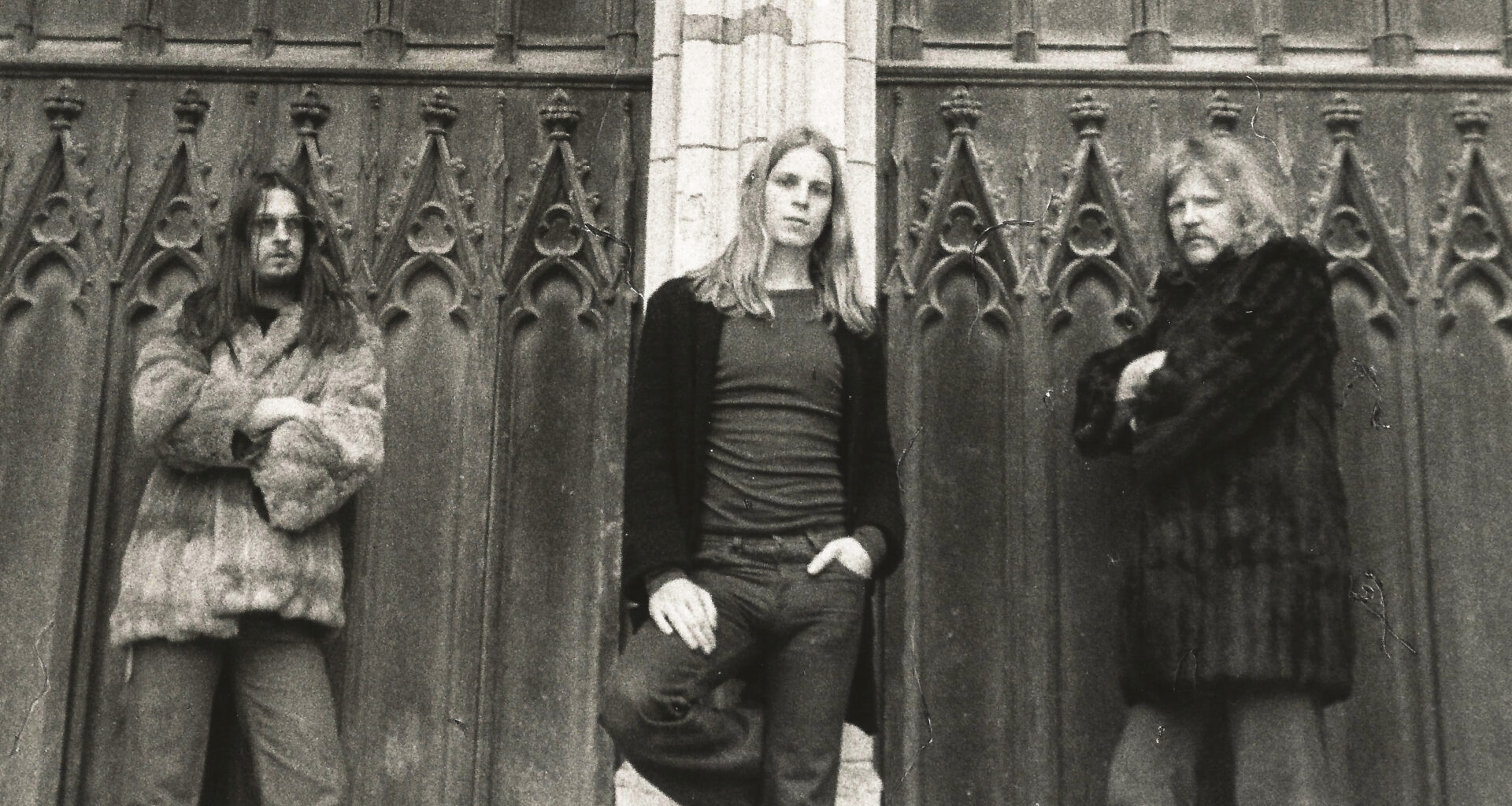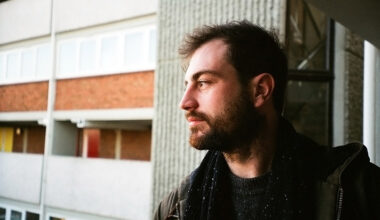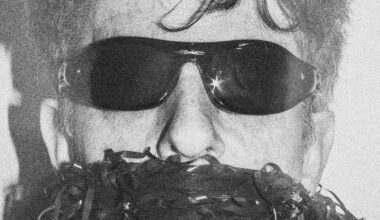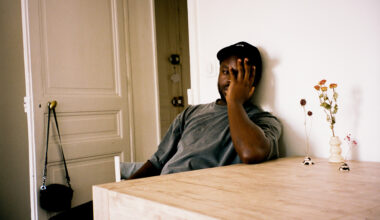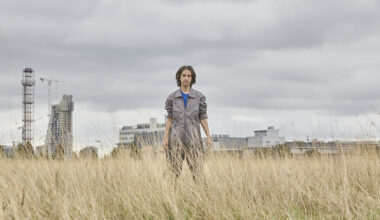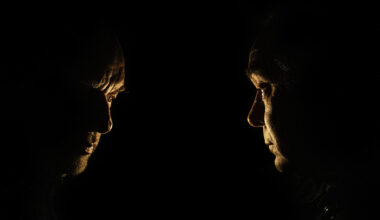The inside story of Tangerine Dream’s infamous performance at Reims Cathedral in France in 1974
Re-live the incredible tale as told by Edgar FroEse in his recently published autobiography, ‘Tangerine Dream: Force Majeure’, which he was still writing when he died three years ago. As this extract from the book shows, it’s a night that nobody who was there will ever forget.
“Can I talk to Edgar Froese? This is Assaad Debs calling from Paris.” A very frail voice brought English sentences in a strong French accent to my tired ears – it was two o’clock in the morning in Berlin. “Assaad who?” I asked, somewhat indignantly, because at that time we were getting a lot of calls from fans who simply wanted to get in contact with us. “My name is Debs, Assaad Debs. I’m running an agency in France and would like to arrange a concert with Tangerine Dream. I got this number from Simon Draper, a gentleman from your record company in London, and I want to book your band for the Reims Cathedral on 13 December.”
OK, I thought, if Virgin has passed on my number, then this can’t be a fake. I asked if we were talking about the Gothic cathedral in Reims, where almost all the French Kings had been crowned. Assaad answered that it did indeed concern the Notre-Dame de Reims, to give its full title, and that he already had permission from the church authorities to organise a performance there. I couldn’t believe that one of the most conventional and conservative associations on the planet had granted us permission to play a TD concert on their property.
It sounded too bizarre to be true. “I have already made a side-letter agreement with the Archbishop’s office, so it’s just up to you to say yes or no,” said Assaad. Even if he’s crazy, I thought to myself, it can’t hurt to check the whole thing out first, as we do have enough time to verify it. The fee he was offering was OK and the gig was to be publicised all over Europe. There was nothing about it that gave me any reason to feel suspicious.
“You have an opening act, which is Nico, former member of The Velvet Underground in New York,” continued Assaad. Of course, I knew who Nico was, even though I had never met her personally. She had lived in an apartment directly across from mine in the Berlin neighbourhood of Schöneberg before she went to New York. ‘Chelsea Girl’, her first solo album, was among my favourite records from the late 60s. I used to listen to it a lot because the melancholy that emanated from this music symbolised the zeitgeist and the sense of disillusionment slowly seeping into the love and peace movement, once so full of hope for the future. I asked Assaad if Nico would be performing with a band. “No”, came the answer, “just her voice and a natural wind-driven harmonium.”
Tangerine Dream had never performed in a big church or a cathedral before. It was clear that the acoustics would be an issue, one that we couldn’t just fix by pressing a button or disconnecting the equipment. In 1974, you couldn’t do a quick Google search and pull up a 3D animation of the structure, receive acoustic transmission measurements over the internet, or exchange in-depth information by email with the local authorities. Preparations were made in the most cumbersome way possible and this often led to delays because of misunderstandings. When we decided to send one of our road crew technicians to Reims, to our astonishment Assaad found this suggestion less than optimal. Somewhat reluctantly, he explained to me he had edited together the calmest parts of ‘Phaedra’ [TD’s 1974 album] and sold the whole programme as “modern classical” as opposed to “progressive rock” music.
So if a long-haired outlaw were to show up in the sacristy to measure every aisle for acoustics, it might cause tension with the episcopal officials – something that had to be avoided at all costs.
The only thing we knew for sure was that Reims Cathedral had a capacity of approximately 2,000 people when full. After weeks of preparation, carrying out acoustic measurements in Berlin churches that produced similar reverberations, our fully loaded truck left Germany on the morning of 12 December in the direction of Reims.
We assumed that we would still be able to play a completely normal, if a little acoustically risky, TD concert.
The next morning, I flew to Paris with Peter Baumann and Christopher Franke. A few hours later, we were standing in front of a truly intimidating building. Both of the huge towers of the cathedral drilled monstrously into the cold, overcast December sky.
Assaad Debs was suddenly standing beside us. He seemed to be a cross between a gangster and an altar boy. His permanent smile was an invisible shield, built to protect him from any impending harm. “Have you got everything under control?” I asked him, with the intention of exuding trust and good will. His answer came reluctantly and indicated there were a few difficulties that they were just sorting out now; after they were resolved, everything would be just peachy! That doesn’t sound quite so professional, I thought, but we still had eight hours until the concert started.

I asked when the soundcheck could begin and Assaad said there was going to be a service at 12 o’clock that we weren’t to disrupt, but afterwards we could get right on with setting up. “Sorry, what?” I asked, genuine horror running through my voice. “In our contract, it says that all the equipment and instruments should be completely set up and that rehearsals are to begin at 12 on the dot.” He mumbled something about not being told about the service, saying he’d had communication problems with the cathedral’s upper management and eventually losing himself in a chain of unintelligible, contradicting rants we could barely understand.
Logistically, it already looked like it was going to be a disaster, but I guessed that this wasn’t the end of our problems, just the overture.
“So where’s Nico?” I asked. “We have to discuss how the entire concert will pan out with her.” Assaad looked at me as if I had asked him about the most intimate details of his private life. No, he didn’t know where Nico was, she was actually meant to be here already, and obviously was not, so we’d just have to wait. Baumann and Franke were standing beside me during this entire exchange. Franke piped up with “They’re just watching the short film ‘The Stoned Coronation In The French Pampa’, with tafelmusik by TD.”
Baumann was about to split his sides laughing when a buttoned-up attendant of the diocese rushed towards us, with the unsettling message that the telephone line was permanently swamped with people still trying to get tickets for the concert. Turning towards Assaad, he wanted to know how this could possibly be, as it had been sold out for months and Assaad’s office in Paris had assured him they would inform the press of this.
“What are we meant to do with these people when they show up here in droves looking to buy tickets and we’ve already reached our maximum authorised capacity?” asked the attendant. “Oh man, this smells like double the trouble,” Baumann chimed in, to which Franke added laconically, “Yesterday, I rang up my insurance guy and increased the policy for my equipment by 10 per cent. It must have been a premonition.”
Baumann grinned but didn’t get a chance to fire anything back, as a tall figure in a hooded black cloak appeared before us. An almost chalk-white face looked at me with empty eyes as she talked. “Hi, we’re performing tonight, right? I’ve brought my harmonium. I’ll speak in German now, I can still speak it, I was born there of course… Oh God, how long has it been? An eternity I suppose…” She turned around without waiting for an answer and disappeared into an old Peugeot that she’d driven here from Paris. I was perplexed when I realised this was Nico, or more accurately, what was left of her once angelic appearance. It was a sad moment. “Those frigging drugs, you give in to them once and they take everything. It’s absolute lunacy.”
Baumann was as touched as I was, even though he wasn’t a big fan of her music or The Velvet Underground.
It was another two hours before we could finally link our instruments up to the power. During this time, Assaad was called to the Cardinal’s office. “They must be hearing his confession, but he definitely won’t be telling the full truth,” Franke suspected. Baumann sent a bass note into the nave and 10 notes came back, each delayed.
“We guessed this would happen, but it’s even worse than we could have imagined,” I said. “We can forget about playing any fast sequences here,” I added. “If we don’t run off a few sequences, then we could just do flat sounds and play a duet with Nico,” Baumann responded. “I had a flick through the annals, the bells in this church are cast in F, G, D#, F and A#, so if the worst comes to the worst, we can just let the bell ringer perform and accompany him with subtle overtones,” I said. Baumann looked at me and grinned as he said, “Man, what have you been smoking? I thought we had agreed to stay teetotal!”.
In that moment, our front of house mixer came up to us. “From the stage to the end of the nave, there’s a delay of exactly six-point-three seconds,” he told us. “You’ll need to keep it in mind, otherwise the crowd’ll be enjoying a game of ping pong with the bass notes this evening that no one can win. ” It was a clear enough message and it amplified our problem massively. Tour managers are sometimes less than knowledgeable when it comes to the fundamental rules of music. With our own tour manager, this was particularly noticeable in that he analysed the situation in a relatively relaxed manner. “Six seconds, 10 seconds, it doesn’t matter, this evening more than half of the people here will be stoned and they’ll be hearing everything doubled or trebled anyway.” Unfortunately, we still needed him for some administrative matters, otherwise we would have loved to press some gas money into his hand for an immediate trip home. We tried to set up the speakers in different ways to eliminate some of the reverberations or at least to reduce them. We had some success with this, but we had not solved the problem entirely. Playing polyrhythmic sequences here would be simply impossible. It quickly became apparent that the night’s performance would be 100 per cent improvised, not just musically, but acoustically too.
While we were still discussing this mess, someone dragged a huge steamer trunk past us and onto the stage.
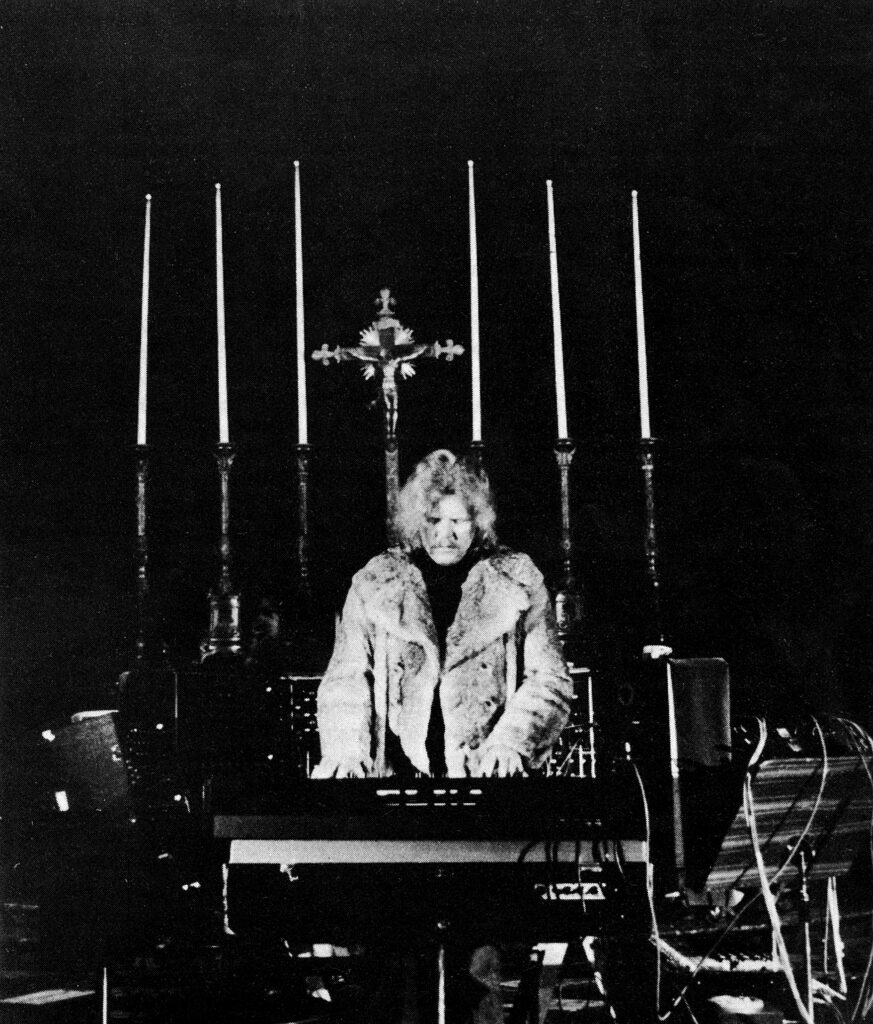
Nico was doing all the work herself and refused any attempts to help her with a dismissive hand movement. She unfolded the box almost ritualistically and the steamer trunk was transformed into a wind-driven harmonium. She had to attach the pedal or there would have been no tone. As she sent out her first melancholic harmonies into the cold air of the cathedral, I observed her unadorned face. How many of her earlier desires had been shattered as they tumbled over the cliffs of this cruel world? In her gestures, there lay an infinite frugality, as if any superfluous movement would have completely disrupted her energy balance.
She played a short piece as a rehearsal – sad, sacred and ethereal. It had more of a requiem character to it than a pop song structure.
On our quest for an answer to our reverb problem, I walked along the entire nave of the church and observed, astonished, that there was just a relatively small entrance on the western side of the building. What would happen if thousands of people streamed in or suddenly wanted to leave again quickly? Hopefully the organisers had come up with a professional solution, I thought. As it soon turned out, the organisers had no idea what they had got themselves into.
At about 8:45pm, in a cathedral nave filled with cannabis and incense smoke, Nico’s sad voice rang out, afflicted with her yearnings for death and appearing to form an eerie energy field of morbid medieval fantasies around her. Her sorrow, this bleak life confession of a once beautiful woman who had swapped diamonds for a few cheap necklaces, was brutally sobering. It wasn’t about the music anymore, nor about some hippy-esque philosophy on life, but about dreams, better dreams, that shattered like broken glass in the enormous nave. It was Nico’s requiem for the living dead and it was incredibly haunting. If the Inquisition had stormed through the pews in this very moment, the conditions could not have been better.
After this performance, we had to change the atmosphere as quickly as possible. We discussed at the very beginning that we would go without all our deep bass notes, particularly those that had a tendency to reverberate anyway, and after a short intro in high pitches, we would start with the polyrhythms. Just as we were heading towards our instruments, a crew member took us to the side and pointed with a telling expression to the audience. The organiser hadn’t been able to create the lighting arrangement we had been promised so, in this pallid light, we looked into the compacted crowd of people that sprawled from the stage to the entrance of the church. I suspected something dramatic was about to happen. “In this cathedral, there’s only space for 2,000 people,” my keyboard technician explained, with alarm in his voice. “Right now, there are 6,000 people here. What do you want to do? Play anyway?”
The sight was a nightmare in itself. Who let this crowd of people in here in the first place? The situation was more than dangerous. “Please get me someone from security as soon as possible, we can’t decide what to do by ourselves,” I said to my technician. “They only have this one guy who’s sitting in the consistory right now, biting off his fingernails with anxiety.” I thought once more about how this was another journey into the abyss of hell on earth, unfortunately not a rare occurrence on these tours. This time, however, it looked as if we had only booked a one-way ticket. Suddenly, someone from the local fire department was standing in front of me and asking questions that I couldn’t answer with my rudimentary French. Monika [Edgar’s wife, who died in 2000], who could speak very good French, interpreted simultaneously. “They have just decided not to clear the area despite the dangerous overcrowding as it could cause a riot if everyone panicked,” she said. “You should, or rather you must, play. And right now!”
We began with dense soundscapes, which then flowed into light patterns. I tried to play some lines of melody on the Mellotron, but couldn’t make out a distinct beat, as rhythmic sequencer chains entrapped me from all angles like spider’s webs. If I couldn’t hear one individually, then the audience wouldn’t be able to hear one either, which was a depressing thought for me. I was forced to think about what our tour manager had said earlier and it turned out he had been right all along. During a quiet part of the concert, I felt someone pull on my trouser leg. In the half-darkness, I recognised my technician, who was trying to tell me that it would be a good idea to take a short break now. The idea was to encourage people to leave the cathedral and therefore relieve some of the pressure from the crowd.
We decided to end the first set with a long bass note and meet with the crew in the back sacristy. We were received by an utterly hysterical and erratic church dignitary, who was completely at a loss as to what to do. In broken English, he talked about what a catastrophe this event would mean for himself and for the community of Reims. I let him speak until he had totally worn himself out and he sank into an armchair covered in purple velvet. Should I try to comfort the pastor? Apologise to him, console him? Instead, I decided to confront him with the facts. Who had allowed this crowd of people into the cathedral? How many tickets had been booked in advance? Why had the concert been allowed to take place with only three toilets for this big a crowd? I tried to keep cool as the dignitary, who carried a large proportion of the responsibility himself, slumped further into the chair.
We soon had to go back into the haze of marijuana smoke, incense and sweat to begin the second part of the concert. We were told that no one had left. Instead, a few hundred fans who had not been allowed in at the beginning had managed to push themselves into the building. There was no one there to stop them, which I considered to be an unparalleled example of gross incompetence. Standing on the stage once more, we unified on a basic E key. From there, we wanted to play in three pentatonic intervals, starting on a high note and then moving downwards. As we were improvising 100 per cent, our relaxed psyches were a great advantage to us. There could be no question of it in this situation. As the sound morphed with hundreds of acoustic reverberations, we were jumping from one idea to the next. Few of our attempts were of a particularly good quality. It was simply impossible to be creative in this situation.
Unceremoniously, the management of the cathedral suddenly switched on two intense overhead lights without any prior warning whatsoever, robbing everybody of any illusions they may have been in a concert hall. The cold, blinding lamps illuminated the Gothic masonry in hard black-and-white contours. What had previously been perceived as purely atmospheric or even eerie had become as clear as day in the dazzling light. While I selected a sample of a male choir on my Mellotron, I was suddenly grabbed by a flashback of the earlier purpose of this building. Inside the sound cascades, an ethereal play of words appeared in my head with sentences like, “With the grace of all French blood of noble stock, we declare the enthronement of King Louis XIV. May his wisdom be to the benefit of all peoples of the French tradition in his regency and to the benefit of the Grand Nation”. All of those self-serving vassals, who had in the distant past sworn an oath at this site using such empty words, still clung to the fine threads of contemporary history across the transepts of this remarkable structure.
After they had been crowned, the potentates who performed their ceremonies here went home and showed through their deeds what they really thought of the holy pledge they had taken, by approving plunder, rape, murder and senseless wars. While the so-called heretical mindset of many true, devout Christians led to them perishing at the hands of the Inquisition, the pockets of the monasteries, cathedrals and abbeys were being filled with the assets of the defenceless people of the nation, paralysed in their fear and servility. As this has been proven historically, there is hardly any reason to doubt the validity of this claim.
These thoughts went through my head as I tried, with my two comrades, to create some meaningful music in this acoustic stew. I can’t remember feeling a single moment of joy or transcendence during this entire concert. I also have no idea how long the concert went on for. At some point, all three of us were just standing there, astounded and looking into the faces of 6,000 applauding people. We didn’t know if we had even come close to fulfilling their expectations. We never did find out.
What we had not realised had been happening over the course of the concert, we would end up reading about in the Sunday editions of all the mainstream French newspapers under headlines like “6,000 hippies and deadbeats desecrate the coronation site of the French kings and emperors”.
Tangerine Dream were, of course, blamed for this, which we viewed as totally absurd. If the church authorities had not allowed 6,000 people to attend a concert, which they knew would go on for over two hours, without even the minimum amount of functioning sanitation, then I would say that had nothing to do with TD or our music. The organisers could count themselves lucky that an extremely cool audience had, despite these adverse conditions and perhaps because of the reasonable entry price, accepted almost everything without kicking up a fuss and had left the cathedral peacefully when the concert was finished.
Having returned to Berlin, we heard in the German news that the entire hierarchy at Reims Cathedral who had been responsible for the affair had been removed from their offices and relocated to other dioceses. In France, there was 16 TV programmes focusing on this topic. A short time later, as a sort of climax to the entire thing, a Vatican decree was agreed to in the Parisian Head Secretariat of the Catholic Church, which prohibited all European church authorities from ever allowing Tangerine Dream to perform on church property again. Both we and our music had been excommunicated by Rome. We could at least be happy that international law prevented the modern Inquisition from burning us at the stake.
Edgar Froese’s ‘Tangerine Dream: Force Majeure’ is published by Eastgate Music & Arts.
